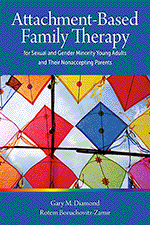
Attachment-Based Family Therapy for Sexual and Gender Minority Young Adults and their Nonaccepting Parents (ABFT-SGM)
ABFT-SGM is a manualized, time-limited (16 weeks), empirically informed, family-based treatment. It is specifically designed to reduce parental rejection and increase parental acceptance of their young adult's sexual orientation or gender identity, and improve the quality of the attachment relationship. The treatment is adapted from ABFT for depressed adolescents (Diamond et al., 2014), and from ABFT for LGB depressed and suicidal adolescents (Diamond et al., 2012). It is LGBTQ+ affirmative, experiential, and rooted in structural family therapy (Minuchin, 1974), multidimensional family therapy (Liddle, 2009), and emotion-focused therapy and theory (Greenberg, 2011).
ABFT-SGM is comprised of five tasks, conducted in sequence. The first task, conducted during the initial session of treatment, is to form an initial bond with each family member and establish building closer, more open, mutually respectful relationships as the shared goal of treatment. The second task is to build a strong therapeutic alliance with the young adult. This is done in the context of individual sessions. This task involves helping the young adult process their emotions (e.g., shame, fear, hurt, assertive anger) associated with their parents’ rejection, and with the rupture in their relationship with parents. It also involves helping the young adult identify and articulate their unmet attachment and identity needs (e.g., the need to feel safe, understood, validated, prized, and connected). Finally, the young adult is prepared to effectively communicate such emotions and unmet needs directly to their parents in subsequent conjoint sessions. The third task is to build a strong therapeutic alliance with each parent. This is done in the context of sessions alone with parents. This task involves helping parents process their emotions (e.g., shame, fear, anger, grief) associated with their young adult's sexual orientation or gender identity. Parents are also helped to reflect upon how their nonacceptance has affected their young adult, and their relationship with them. Finally, parents are prepared to reach out and listen openly and empathically to their young adult's pain and unmet needs in subsequent conjoint sessions. The fourth task, the attachment task, is the purported primary change mechanism of the treatment. This task is conducted in the context of conjoint sessions and consists of corrective attachment episodes. During such episodes, the young adult effectively communicates to their parents, often for the first time, their experience of feeling rejected. The young adult is helped to convey their vulnerable emotions (e.g., loss, sadness, loneliness, shame, sense of worthlessness, fear), legitimate assertive anger, and unmet attachment and identity needs (e.g., the need to feel understood, validated, accepted, prized, loved, connected, respected, and protected). At the same time, parents are helped to respond in an attuned, empathic, non-defensive, validating, and caring manner. Such positive parental responses, which are new and qualitatively different from past negative responses, lead the young adult to feel safer, less anxious, better understood, validated, cared about, accepted, more trusting, and connected. Parents, for their part, feel less distressed, more agency, and closer to their young adult. Together, these processes lead to deeper, more open, honest, loving, meaningful, and mutually respectful relationships. Finally, after tension in the relationship has diminished, the fifth task of the treatment involves helping family members work collaboratively
as they consider future shared challenges (e.g., the young adult's continued transitioning, coming out to extended family, bringing a partner home for the holidays).
ABFT-SGM was shown to promote parental acceptance, reduce parental rejection and improve young adult-parental attachment in an initial open clinical trial (Diamond et al., 2022). Currently, we are conducting a two-site, fully powered randomized clinical trial comparing ABFT-SGM to CBT for LGBTQ+ young adults and their nonaccepting parents. To purchase the book and learn more about ABFT-SGM, please click the image of the book below.
